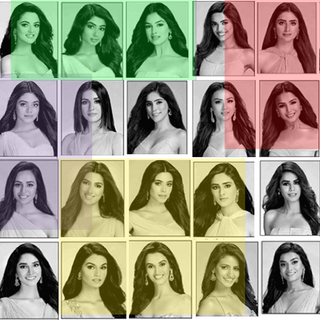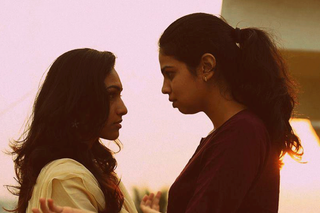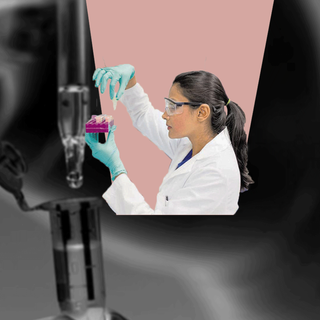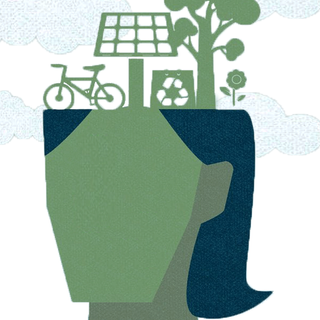
‘The ‘Other’ Love Story’ Portrays Accessible, Relatable Same‑Sex Relationships
The mini-web series, set in the ’90s in Bengaluru, portrays homosexuality within a middle-class Indian society.

Aachal and Aadya, two neighbourhood friends in their teens, are hanging out on Aachal’s terrace, just about to share a moment of intimacy, when they are interrupted by a middle-aged man who has come to fetch his washed and dried laundry off the clothesline. He begins to comment on their friendship and how it’s so nice to see the two of them always hanging out with each other. Aadya and Aachal, bored by this small talk, can’t wait for him to leave so they can finally kiss each other.
In Roopa Rao’s 2016 mini web series The ‘Other’ Love Story, Aachal and Aadya are lovers, who first express their affection for each other through a tender brush of fingers. The two teenagers, in the late ’90s, belong to middle-class families in Bengaluru during a time when homosexuality isn’t just unacceptable, but also criminal. The show’s setting roots the idea of same-sex relationships in mainstream Indian society, helping to normalize the idea for the viewer.
Fast forward to September 2018: homosexuality was decriminalized by the Supreme Court of India and several directors started portraying same-sex relationships in their web series on Netflix, Amazon Prime, and other online platforms.
While the effort is noble, the shows are barely inclusive and reek of privilege. The homosexual characters in shows such as Made In Heaven and Four More Shots Please are either male or rich or both, making them largely urbane and therefore inaccessible.
A repercussion of such inaccessible characters is the alienation of the majority of Indian population that does not relate to the lifestyle — and may consider queerness a part of that way of life, and thus not an option for them. Things they could take away are: ‘Oh, this happens only in rich people’s lives,’ and ‘this new-age western concept is polluting Indian culture.’
Made In Heaven’s Karan Mehra, for example, is a handsome homosexual man played by Arjun Mathur, who finds it fairly easy to move around upper-class Delhi circles and hook up with other handsome men, without necessarily being emotionally committed. While it gives us a sense of the struggle faced by the queer community in India, we don’t see Mehra struggling with his sexuality – his class privilege allows him to be comfortable with who he is in his milieu, without having to attach shame to his identity. He does face difficulties because of his sexuality, but that is only from the society at large, and not his immediate social circle.
Related on The Swaddle:
‘Made in Heaven’ Shows the Calculated Compromises Women Make to Survive
In Four More Shots Please, personal physical trainer Umang, played by VJ Bani, is the only queer protagonist (the other three are straight). She lives in South Bombay, meets with her posh girlfriends for drinks often, and has an affair with her client who is a celebrity actress.
The ‘Other’ Love Story, on the contrary, is set in the late ’90s; Aachal and Aadya are mostly seen wearing salwar-kameez; they take the local BMTC bus to college; they have curfews and restrictions at home about whom to meet and for how long; they don’t spend time on makeup; both of them use landlines and public phones to make calls, and lead modest lives.
Aachal lives with her mother, sibling, and extended family, while Aadya lives with her parents (her mother is a strict school teacher) and sleeps in the living room. A poster glued to the back of her main door has a quote by Rumi on it: “Lovers don’t finally meet somewhere. They’re in each other all along.”
Their love develops over a span of three years: First with the tender touch of their fingers. A few weeks later Aachal plants a peck on Aadya’s lip after Aadya has a wet dream about her. And some more time later, they finally share their first proper kiss that leads to a more intimate experience. Aadya hesitates before going any further and explicitly asks Aachal for her consent: May I…?
Later, she worries if Aachal enjoyed the intimacy and hopes she didn’t enforce it on her. With horror stories emerging from the #MeToo movement, it’s refreshing to see this lack of entitlement portrayed with such nuance, which could have only come from a woman.
In both Made In Heaven and Four More Shots Please, sex is seen for what it is, minus emotions. Both Karan and Umang treat the act as a means to satisfy their physical needs, therefore subtracting the vulnerable, humane aspect from the equation. There is no romance. And while there is nothing wrong with that, abundant unfeeling portrayals of intimacy is where these shows perhaps fail to connect with their unaccepting heteronormative audiences, and fail to normalize homosexuality.
The ‘Other’ Love Story, available to stream on JLT Plex, encapsulates the essential emotions of two lovers, irrespective of gender, therefore adding nuance to same-sex relationships.
Aachal and Aadya exchange greeting cards, wait impatiently to see each other the next day, take long walks, write “Dear Diary” entries, and share a Kit-Kat to make each other feel better. Before lovers, they are friends, sharing the experience of two people falling in love for the first time. They do all the things that teenage heterosexual couples from middle-class Indian families did in the ’90s.
Related on The Swaddle:
How Caste Has Always Shaped Desire, Desirability
They speak in Hindi, rarely in Kannada, and in imperfect broken English, much unlike the cosmo accents of Jim Sarbh and Kalki Koechlin in Made In Heaven.
There is also no butch-femme segregation in the show, a lesbian relationship stereotype abundantly found in pop culture. Both Aachal and Aadya are average Indian teenagers with no stereotypical markers that could possibly reveal their sexual preferences. (And although there is nothing wrong in making that butch-femme portrayal because that would’ve been equally real, Hindi cinema has, in the past, unfairly stereotyped butch characters as lacking “feminine mannerisms,” undesirable and not “woman enough”).
In the show, when we see Aachal and Aadya – two ordinary girls – fall in love, we don’t feel alienated. That it is set in the ’90s makes it even more relatable and less ‘new-age’. We get a sense that this could happen in our lives, to people we know, to us, and that it’s ok.
Chandni Doulatramani is an independent journalist based in Bangalore. She writes on travel, food, gender, cinema, technology, and pop culture. Her work has appeared in Foreign Policy, VICE, The Caravan, National Geographic, and Mint Lounge, among other publications. She previously worked with Reuters and Mint as a financial journalist.
Related


Despite Education Gains, STEM Women in India Still Face Unequal Field
